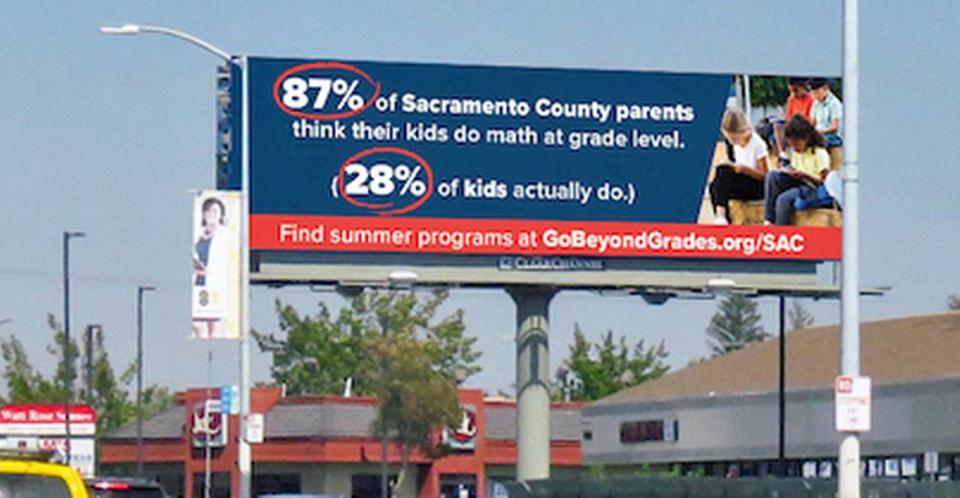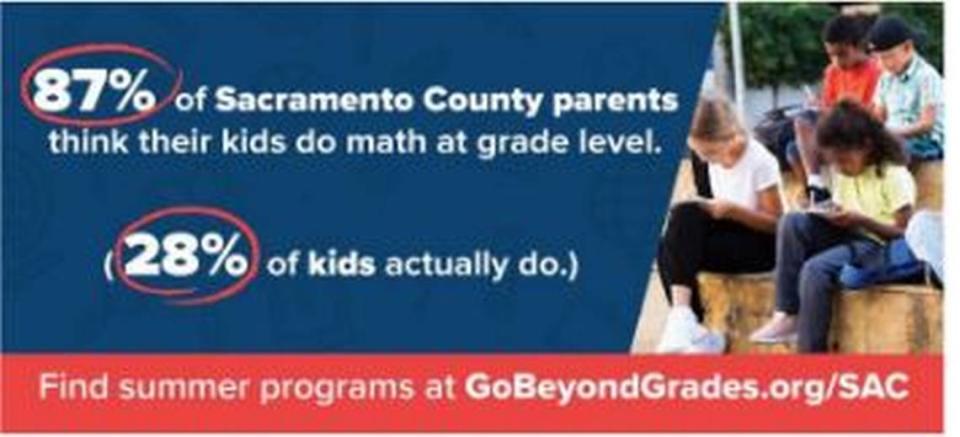Do Sacramento parents have false sense of kids’ learning level? Billboard campaign says yes
Sacramento County parents driving along local roads and highways may soon see startling statistics displayed on billboards about children’s academic performance.
“87% of Sacramento County parents think their kids do math at grade level,” reads one billboard. “28% of kids actually do.
Sacramento County is one of six regions in the billboard campaign, funded partially by the Bill and Melinda Gates Foundation and others. Supporters of the campaign include Clear Channel, Learning Heroes, Univision, Parent Teacher Home Visits and others.
The billboard includes a website titled “Go Beyond Grades,” which connects parents to summer learning programs and encourages parents and teachers to talk about student progress.

The campaign is meant to juxtapose parent perceptions of how well their children are doing compared to their standardized test scores.
About 10 traditional and digital billboards will share messages about how many local parents think their children performed academically at grade level, versus how well they are actually doing.
“While this is an all-hands-on-deck moment in public education, most parents are not aware they need to be in the boat,” Cindi Williams, co-founder of Learning Heroes and mother of two, said in a news release.
“Parents are problem solvers, but we can’t expect them to solve a problem they don’t know exists. Now is the time to partner with our teachers to find out how we can use the summer months to address missed instruction.”
The statistics shared on the billboards come from 2022 Smarter Balanced assessment results that showed 45% of Sacramento County eighth graders were at or above grade level in reading and 28% were at or above grade level in math.
But parents may not be aware their children are behind, according to research by Learning Heroes, a national nonprofit that supports adults navigating being a child’s education advocate.
Nearly 90% K-12 parents in Sacramento County believe their child is at or above grade level in reading and math, regardless of race, income or zip code.

And more than two-thirds of Sacramento area parents said their children earn As or Bs on their report cards, according to new Learning Heroes research.
“The disconnect may contribute to why parents don’t seek additional academic supports like summer school and tutoring for their children at a time when multiple studies, such as the Nation’s Report Card and Education Recovery Scorecard, show a significant increase in learning gaps, especially in communities hardest hit by the pandemic,” read a statement from Learning Heroes.
Gina Martinez-Keddy, executive director of Parent Teacher Home Visits, told The Sacramento Bee the goal is twofold: provide parents and families with the fullest picture of how their children are doing in school, and provide them with access to information on summer programs and resources to help their children academically.
“We want to make the best use of all the summer learning opportunities for students – particularly those who are most vulnerable – that Sacramento County has to offer,” Martinez-Keddy said. “We know families are eager to be engaged in and make informed decisions about their child’s education.”
The campaign will make its way to several other cities, including Boston, Chicago, Houston, New York City and Washington D.C. Organizers chose cities where there were enough summer resources to choose from.
“Families want the best for their kids, and they are willing to invest their time and resources,” Martinez-Keddy said.
“But some families have more resources than others. And we are trying to get a diverse list of summer learning programs for a wide range of families. We really recognize that the pandemic did not hit families evenly. Students might need more support, and we want to make sure there are programs that fit with whatever means they have.”

